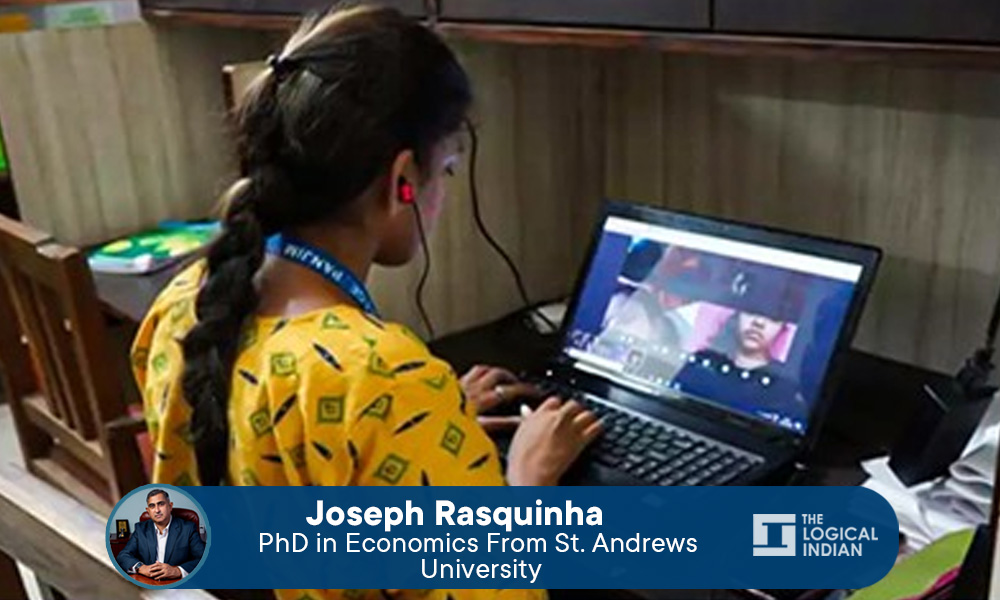
Image Credit: The Times of India
'Ignore Online Education At Your Peril': Colleges Should Recognise Importance Of Online Offerings Soon To 'Save' Themselves
India, 17 March 2021 1:59 PM GMT | Updated 18 March 2021 6:02 AM GMT
Creatives : Abhishek M |
" An engineer by profession, Abhishek is the creative producer of the team, graphic designing is his passion and travelling his get away. In more ways than one, he makes the content visually appealing."
Guest Author : Joseph Rasquinha
He holds a PhD in Economics from St. Andrews University, Scotland, with 25 years of experience in India, China, Singapore, UAE, and the UK, with two books to his name.
The path institutions adopt further will be the determiner of how many of them survive or even remain relevant in the university rankings. Those that recognise the importance of online degrees and job-ready plug-ins to make their students job-ready will be able to attract larger student numbers.
The COVID-19 Pandemic has brought Star Wars to life. A lot of educational institutions and companies are now moving at warp speed to add online offerings to their portfolio! In fact, it is estimated that Global education will grow by an additional 1 trillion dollars over the next few years, with online offerings being a major contributor to that growth. To put it in perspective, a growth of 1 trillion dollars is 35% of India's GDP, which just indicates how enormous the potential of education over the next few years is.
The Present Education Scenario
Unfortunately, the majority of institutional and educational entities are in stasis mode with optimistic expectations of resumption of regular offline activity with the advent of vaccination drives across the populace. The optimists, as we can call them feel that even if COVID-19 is prolonged, there will be a path back to regular offline education.
Their confidence comes from the very psyche of the Indian people who look at education as a necessity. Present private, government, and even statutory authorities, feel that online offerings will always be a poor cousin to offline education.
This opinion is further boosted by students wanting to go back offline as online has shown pitfalls few have expected in terms of motivation, examination validations, and other aspects. While there is no doubt that offline education will resume at some stage, what everyone is missing is that there has been an important shift. This shift is in the job market. Job opportunities are starting to look challenging.
This will soon start reflecting on the education market in terms of placements, the cost-effectiveness of studying in expensive colleges vs online, and a host of other factors, which will be expounded in this article.
The Question of Why?
Rather than look at the traditional picture like everyone does, I wanted to look at it from a different perspective. The perspective of someone like Elon Musk, who is so disruptive that we all wonder how he succeeds! When he started his SpaceX project, I thought that it was the most foolish venture possible. Putting satellites into space? Going to Mars? Compete against NASA and every major business in the world like Google and Reliance? Ridiculous! Today, when SpaceX is offering internet to any remote part of the planet for 99 dollars by using a dish (like SKY or Star), I wonder how he did it.
In fact, all he did was apply what is known as the 'First Principles' originally expounded by Aristotle, which in its rudimentary form is Why? Why? Why? From a pre-COVID-19 education perspective, the question was: Why was there a rush for degrees and education? It's a simple First Principle calculation.
Education gave you a 100% or at least a 75% return on your investment. If you spent 5 lakhs on your MBA, you would get a job for at least 5 lakhs, or in a worst-case scenario, a 3.5 lakh job (a 30,000 a month job), which in pre-pandemic times was not very difficult in a market as enormous as India with 52 million Small and Medium Enterprises and a large startup sector.
When we saw the reporting of IIM placements at salaries of 20 lakhs or more, what we did not see was that their fees are around the same amounts, so the return on education investment was still 75-100%, just like the rest of the industry. The only difference was the job roles and advancement paths.
The Post Pandemic Situation
But the post-pandemic situation will be very different. There is no doubt that there will be a return to pre-pandemic offline education. However, if we apply the First Principles to the situation, we will understand that the education sector is headed for drastic changes.
Why? Because at the end of the day, it's not about education, but about the jobs. It's always been about jobs. And the success factors here are under tremendous pressure. No more will you get a 100% return on your education investment, or even a 75% return.
Many companies have been adversely affected by COVID-19, and with the shrinking to the decimation of various sectors, you will be lucky to get a 50% or even a 25% return on your education investment. Let look at a simple example to explain the statement above.
If you spend 5 lakhs on your MBA, then getting a job at 2.5 lakhs today is a bonus. But with colleges still in the pre- covid mode of expecting their graduates to get jobs in the range of 5-10 lakhs, and with no intention of reducing fees, there will be a major mismatch.
In fact, this mismatch of fees and job offers has the potential to shatter the very survival of a huge number of the 30,000 colleges in India, who rely on their offline, real estate, and statutory offerings, not on the actual salaries of jobs given to their graduates. Don't get me wrong. I am not talking about percentages of people placed. I am talking of percentages of what they are offered in jobs to what they have invested in education.
If 75% of the students in a final year are placed, the institutions heave a sigh of relief and concentrate on the next batch. But, if these 75% of students are placed at a salary that is 1/3 of what they invested, then education becomes a problem, and suddenly online looks very attractive.
Ignore online at your peril
So why online? We all know that online is the future, but the complacency of offline is still ingrained in everyone. Scott Galloway, a Professor in Stern in a controversial article in 2020 stated that most colleges would be history in a decade as companies like Google and Apple don't need degrees for jobs.
This is true, but will not happen easily in India and Asia, because they have an ingrained belief in education and jobs. And that is the belief that will make online so powerful because it is hugely cost-effective and offers the possibility of a job at a 125% or even a 100% return on money invested in your education.
Thus, if your online MBA costs 2.5 lakhs, you may even get a job at 4 lakhs, because of the additional skills you have added to the online courses which make you job-ready. Most institutions are incorporating online to hedge their bets. Their attitude is that online is something that has to be done, but not at the cost of the offline courses.
While that is understandable, it is a major mistake to give online step-motherly treatment! Online degrees have the advantage of job-ready modules from any location of expertise which offline just cannot do.
The most important aspect of online degrees is that they can be added outside the statutory syllabus because the statutory syllabi today are just not making the candidates job-ready. And, not being job-ready is a death knell in the covid world for students, when existing staff are willing to take pay cuts to keep their jobs.
On the other hand, If the colleges have online degrees with job-ready plugins, the transition to the job market becomes smoother. Most importantly, the plug-ins cannot be the general audio/visual courses offered by the various MOOC (Massive online open courses) vendors as they don't have monitoring, mentoring and validation which are the critical elements for success.
Will online education really be part of the mainstream?
It has already become so and the developed nations are adopting it with great foresight. If you look at the basic First Principle question: Why will the online degree market make a difference? The answer is its enormous cost-effectiveness.
Statistics show that over 50% of students to colleges are from locations outside their place of study, and the added costs of travel, boarding, and lodgings are saved by doing online degrees. The move to online degrees will soon become a rush as colleges realise that they need to make up the shortfall in offline offerings.
However, unlike the offline courses where there are limitations on classrooms, location, and teaching resources, online has no such limitations. A college can add 25,000 students in an academic year at the expense of other colleges. This will lead to enormous college closures.
Unfortunately, the writing on the wall is not yet visible to most. They still feel online is either temporary or in most cases, something that is there to be added on as a distant and very poor cousin.
The path forward
The path institutions adopt further will be the determiner of how many of them survive or even remain relevant in the university rankings. Those that recognise the importance of online degrees and job-ready plug-ins to make their students job-ready will be able to attract larger student numbers.
In the post-COVID-19 world, the real estate of the institutions, their reputation, and the extra-curricular options they offer will take second place to jobs placements and cost-effectiveness of the degree. However, at present, there does not seem to be much of an understanding among the educational institutions on how much the situation has changed.
This change will be exacerbated once the government further eases norms for foreign institutions to come to India, as foreign institutions have embraced online enthusiastically and are far ahead of us in terms of the variety, skill, and technologies they offer. If they get the cost-effectiveness and job placements right, then the Indian educational institution ecosphere is in major trouble.
However, it's still not late. Online is still being adopted. All we can hope is that colleges recognise the importance of online offerings and save their organisations. Its never too late to alleviate disruption, even if you cannot prevent it. As a first step, online degrees should be included as a part of the offerings. The faster institutions move in this direction the better for them, even if it is a little step!
 All section
All section














